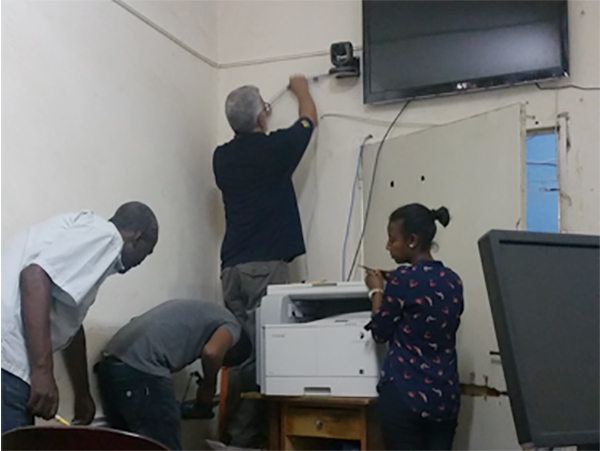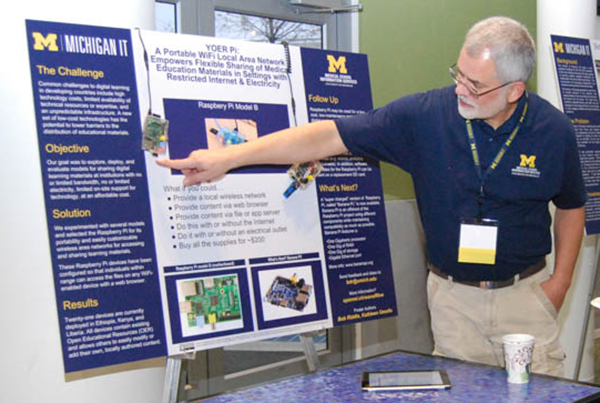Ethiopia. It’s a country with limited bandwidth and just a single internet service provider—the government. But don’t count it out for videoconferencing.
“Video conferencing has exceeded my expectations.”
—Bob Riddle
Using collaborative technology for videoconferencing began as a pilot with U-M in March 2014, but the international partnership goes farther back. “We asked ourselves, ‘What can we do to educate residents in Ethiopia without requiring extensive travel?’” said Bob Riddle, software engineer for Health Information Technology & Services (HITS). “How can we take advantage of the education that is already available, both within the country and beyond?”
Riddle knew that a successful learning environment needs a human element—face-to-face dialogue—as opposed to one-way, digital curriculum. His solution? “Videoconferencing has exceeded my expectations.”

Bob Riddle configures videoconferencing infrastructure with colleagues in Addis Ababa, Ethiopia.
Connecting global partners with Michigan Medicine
More than 150 U-M faculty representing 30 departments are engaged in global health with collaborations spread across more than 70 countries. Michigan Medicine has agreements with 31 partner schools and institutions abroad through its Office of Global REACH.
The first project undertaken by Michigan Medicine in Ethiopia started in 2011 and focused on launching a competency-based, OB-GYN residency program—the first of its kind at St. Paul’s Millennium Medical College. It was spearheaded by Prof. Senait Fisseha, U-M adjunct professor of obstetrics and gynecology, who was raised in Ethiopia.
The OB-GYN residency program included collaboration with Open Michigan to produce open educational resources, digital assets that opened the door to technology collaborations across the institution.
Setting up videoconferencing was just a day in the life for Riddle. As part of his HITS role, he has been supporting the IT infrastructure of St. Paul’s from Ann Arbor since 2013. He’s also been on the ground in Addis Ababa, Ethiopia, since 2015 through the Center for International Reproductive Health Training, a group that trains health professionals in low-income countries in life-saving reproductive health services and comprehensive family planning.

Bob Riddle presents at the Michigan IT Symposium in 2014 (download PDF poster). The topic: how to share digital learning materials at institutions with no or limited bandwidth, electricity, and IT support.
Getting it right in Ethiopia
When it came to making videoconferencing work in Ethiopia, Bob Riddle and his collaborators were met with many challenges. Faced with limited bandwidth and too few IT staff, they needed a turnkey solution.
“Bob is always concerned and tirelessly visiting us to check the technical setup,” said Seyoum Assefa, chairman of the Department of Anesthesiology at St. Paul’s Hospital Millennium Medical College in Ethiopia. “His response is very fast whenever we have difficulties.”
“Videoconference lectures are very important for institutions with few faculty members.”
—Seyoum Assefa
The Department of Anesthesiology at Michigan Medicine broadcasts weekly lectures to clinical residents in Ethiopia and elsewhere. That frequency is rare in the medical community, where most meetings occur monthly or quarterly. “Videoconference lectures are very important for institutions with few faculty members,” said Assefa, who also praised the fidelity of the video and audio: “The lecture is clear and we can easily hear the voices.”
BlueJeans is the preferred videoconferencing tool at U-M. Prior to that, Riddle used a competing, software-based service that also offers videoconferencing and screen sharing. But it wasn’t quite right. “We found that the prior solution was not as accessible, and it didn’t behave nearly as well as BlueJeans,” said Riddle.
They also tried a hardware solution built on technology that does not perform well in limited-bandwidth environments. BlueJeans service adjusts dynamically to the amount of bandwidth available, keeping the connection stable for a seamless user experience.
Another challenge: Ethiopia has only a few available public IP addresses—almost everything is connected to a NAT network, which assigns a single public address to devices inside a private network. “The wonderful thing about BlueJeans is you can be on a local network with private IP addresses, and you don’t have to do anything. It just works,” said Riddle.
